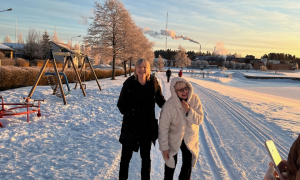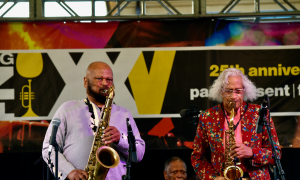Home » Jazz Articles » SoCal Jazz » Pontus de Wolfe: The Genre's First Responder
Pontus de Wolfe: The Genre's First Responder

Courtesy Jessica Silversaga
Fifty songs in twelve hours with twenty musicians is a good elevator pitch. It needed to be a big splash in order to give people's minds a break from all the worry.
—Pontus de Wolfe
We expanded well into other aspects of de Wolfe's career, as well as going back to where it all began. We ended up in the present and had an enlightening chat regarding the manner in which Sweden has faced the pandemic. Much differently than here in the United States, even well different than a neighboring country such as Norway.
But it is de Wolfe's musical journey culminating in his grand gesture of hope and togetherness that takes center stage.
All About Jazz: Well, sir, thank you so much for coming on board today. I have been very much been looking forward to it. So, to start with, what part of Sweden are you located?
Pontus De Wolfe: Thank you Jim. So nice to finally meet you. My office is at the absolute center of Stockholm on an island called Skeppsholmen. Stockholm is basically filled with water. There are seven or eight bridges that connect everything. I take the ferry each morning to go to work from my home in Sodermalm. It's connected by a bridge as well, but why wouldn't you travel by boat? (rhetorical and with a smile)
AAJ: You are right in the hub of activity, but recently you have spoken a little bit too, about a nearby island that many utilize as a vacation retreat. I believe that you can only get there by airplane. What's the skinny with that place?
PW: Yes, that is much bigger. Its called Gotland and is on the east side of Sweden, about three hundred miles from here in Stockholm. Yes, you can only get there by plane or boat. A very beautiful place. We have a little cottage there.
AAJ: That's just super that you don't take all that beauty for granted. Instead taking the time to stop and smell the daffodils. Well, I believe we have covered geography. Let's open up our folders to music. We can cover algebra later (laughing).
PW: (laughing as well)
AAJ: Obviously there is much that came before, but I became aware of your work earlier this year through your massive Stockholm Corona Sessions efforts. How and why did that project come to be?
PW: It actually was a massive change in my life and my work process as well. I was a jazz pianist, and it didn't take too long for me to recognizes that there were other players who could play better than I could. So, I started Jazzagenturen (which translates to jazz agency) to fill a void I had spotted. That being that I had/have many friends and acquaintances who are very talented players, and at the same time there were many bands not being able to find the right fit for their band. My agency, Jazzagenturen, has been very successful in matching up personnel.
AAJ: You found a need and filled it. Generally, that is the mark of a good businessman.
PW: There are many very talented musicians here in Sweden. Many, if not most, aren't very good at promoting themselves. I form bands from within the personnel that I have, to fit an occasion. People tell me what they are looking for musically for a particular occasion, and I can mix and match from within my crew of musicians to form exactly what they are looking for.
AAJ: Being a savvy businessman is one thing, but your response time and actions towards the pandemic announcement in March 2020 went deeper. This came from the heart. Tell us how this remarkable project came to be.
PW: All our hope and dreams were crushed in March 2020. I was desperate in finding work for myself and for all these lovely musicians. Very quickly, one after one, I saw these men and women forced to put their instrument in the closest and take any other job they could find just to pay rent and put food on the table. I got an idea from watching a documentary on the great Miles Davis. Miles was unhappy with a record deal and still needed to record three more albums for that label. He then recorded three albums in two days to get out of that record deal. I did some math and thought if I put together three bands, and let them play for twelve hours, that I could probably squeeze in four songs an hour. Fifty songs in twelve hours with twenty musicians is a good elevator pitch. It needed to be a big splash in order to give people's minds a break from all the worry. Obviously, the music needed to be first-rate for any of that to matter.
AAJ: I believe you made a good call in releasing the songs over time in a five-CD set. I have heard and reviewed the first two CDs of the Stockholm Corona Sessions Volume One (Bra Skivor, 2020) and Stockholm Corona Sessions Volume Two (Bra Skivor, 2020) Looking forward to Volume Three, which I would think is about due, yes?
PW: Yes, in about a month or so. I've been saving some stuff for you, my friend(with a chuckle).
AAJ: I'm glad to hear that! Outstanding.
PW: All these artists worked so hard on this project. They had limited time to rehearse, but they did and then some.
AAJ: Clearly, the arrangements are tight. I got the impression that everyone was really into it, brought their A game, and maintained it throughout the marathon.
PW: It was a brilliant day. We had some media attention and some eyes looking our way. People were kind enough to donate money for the studio time. The musicians were indeed all really into it. Some younger musicians looking to prove themselves playing with established big-name Swedish artists. But mostly just the spirit and camaraderie of bonding together to do something meaningful in troubled times. Many brought in original compositions and arrangements. All wanted to show their best side. They brought everything they had to give.
AAJ: You can hear the heart and togetherness in this music. Comforting to all of them, but in the bigger picture a comfort to many around the world to hear and feel people facing uncertain times in such a positive and uplifting manner.
PW: People were terrified at the outset. To channel all those emotions and nervousness in this manner manifests into moments of greatness. But the project, and ultimately even more so, the music, is quite cathartic.
AAJ: I believe so. Once again music is the great equalizer. But it took some quick, yet cool and calm thinking, and a lot of organizing in a tight window to make it happen and be successful. I believe congratulations and thank you are both in order.
PW: You're so very kind to say that. Thank you very much, Jim.
AAJ: It's uncommon to talk this much about a record without having tapped into the songs themselves. The sequencing had to be a challenge with such a variety of music. In the end it became part of the success. The first two records flow nicely even with the diversity of a couple of Cedar Walton tunes, including a really sharp take on "Ojos de Rojo," a Duke Ellington composition, and then going all the way "Over The Rainbow," with a stunning vocal performance from Isabella Lundgren on Volume 1. I'm curious as to how you chose the fifty songs. That seems like a lot of songs, but really a drop in the bucket of all the great music that has been written.
PW: Well, first of all I surrounded myself with musicians that I really have a lot of trust in. I relied heavily on their input. I asked them about songs that were tucked away that they had always dreamed of playing with a big band. We started making a list with an email conversation group. We were looking for songs that are diverse and songs that individual musicians have a special connection with that could lead to a unique take.
AAJ: On Volume 2, instead of Cedar Walton, you pay homage to Thelonious Monk. Like the first disc, you included a couple of new tunes, expanding the diversity even more. One in particular that really stood out to me is an Eric Palmberg composition called "New but Blue." The trumpeter's note selections and the way he played them had a real charm and personal integrity to them.
PW: Yeah, Eric is a cool guy. He is very ambitious and I like him a lot. Eric, like many others, brought his own personality to the mix.
AAJ: Ambition is a word I would use to describe your musical path, as well. I believe you started out at a very early age on the classical piano.
PW: Yes, probably because that really was the only kind of piano my mother and grandmother knew about. They put me in a classical piano class with a teacher. My father was an artist and a painter. He infused me with all kinds of different music and different ways of expression. There was the eighties music that I grew up with, of course. The Beatles and lots and lots of jazz. My father was really into jazz.
AAJ: So, well rounded from the beginning. Yet it was in high school where it really all came together for you, correct?
PW: Yes, I went to a music school here in Stockholm. I pretty much played music day in and day out. It was a great breeding experience for creative minds. I'm almost forty now and most of the people I still work with today went to that school. We got to know each other there and it has been like a lifelong investment.
AAJ: That's remarkable, as well as very cool. You have now released I believe nine albums.
PW: It's something like that, yes.
AAJ: Your bandmates, for the most part then, are cats that you went to high school with.
PW: Yes. I dabble in retro rock and pop music. I have always been attracted to the concept that no two concerts are alike. Even if you are playing pop or rock music you should be able to get a new experience from each concert. You should be able to play songs in new ways. I was really interested in bands like Led Zeppelin.
AAJ: You and me both, man. That's as good as rock gets right there. I'm old enough to have seen them play live.
PW: Oh my gosh, that must have been divine. Did you see them in America?
AAJ: Yes, I saw them at the Long Beach Arena in Long Beach, California. It was their fourth tour. Many called it the "Stairway to Heaven" tour.
PW: Wow! Such legends.
AAJ: Indeed. How would you describe the genre of music on your records?
PW: They are very organically played. They are very influenced by The Beatles, but also bands that came later like Radiohead and The White Stripes. Guitar bands that really rocked out. Recently, I have calmed down and have been producing a lot more. I have focused on learning modern production technology and have become somewhat of a whiz kid with all of that. That's the direction that I found I needed to move to in the digital age.
AAJ: There are absolutely no live gigs here in America. I have heard that things are starting to open up in parts of Europe. What have you seen in Sweden and what's the word on the street elsewhere in Europe?
PW: We have a different and unique attitude toward the pandemic here in Sweden. We have kept our society quite open and put in recommendations and civil responsibilities on the people. It is on the individual to take on personal responsibilities to keep themselves and others safe.
AAJ: That is, of course, entirely different than the approach in America. Expand on that a bit if you will. How is that approach working in Sweden?
PW: Well, Sweden is a very small country. We have experienced nothing but peace for over two hundred years. So, I think just slamming down a whole bunch of rules wouldn't go over very well. We don't respond well to that sort of thing. Heavy quarantining and that sort of thing just wouldn't be the answer here. We did experience the toilet paper phenomenon at the beginning where people were hoarding toilet paper.
AAJ: Yes, we had the same thing. Still don't know why. It made no sense.
PW: Yes, we saw that on television news from America. We all thought it was strange to be hoarding toilet paper here in Sweden, where the land is predominantly forest. I don't think we will be running out of toilet paper any time soon (laughing).
AAJ: (laughing) The only thing anyone knew early on was that it affected your breathing. I'm not sure how toilet paper helps with that.
PW:(laughing) Yes, we were, and I guess still are, wondering about that here as well.
AAJ: I suppose we just chalk it up to people doing odd things when they panic. But getting back to how well the open and take responsibility concept is working in Sweden.
PW The philosophy here is to not change the rules. Not to enter lockdown and then open back up and then lockdown again etc. People get tired of that sort of thing. We have had very little problem. People understand the situation and are being responsible toward themselves and others. It comes down to a little bit of common sense.
AAJ: Well, as you say, Sweden is a much smaller country and easier to keep under control. But right, if you don't feel well than don't go out. Think about other people.
PW: Certainly. I think every country has to do what is right for them and their people. Here in Sweden, they have chosen to stay calm and handle it in, let's say a grown-up way. Trusting people to wash their hands and be considerate of others. Getting back to gigs. That is the one thing that they did shutdown here, is all the concert halls. Other businesses are open. They did just recently start allowing shows up to a maximum of fifty people. Then they just announced that the number is going up to three hundred people. There needs to be one yard between people. So, you actually need a venue that holds two thousand people to accommodate three hundred.
AAJ: Right, but that's great news. I have a friend in Italy who has had a few gigs lately. Also, a couple from America that recently went to Denmark to play eight indoor gigs. So, signs of encouragement in Europe.
PW: Yes, but I believe we still have a way to go before we come out of all this.
AAJ: You have to wonder what will come of these times musically.
PW: Yes, yes that is an interesting subject. How does all this change or effect the music? Will the music of the twenties be strong and memorable coming off of such a difficult time?
AAJ: You leave us with something deep to ponder, especially when you think of how many great tunes came out of personal tragedy or societal strife.
PW: One other thing I wanted to mention is that Jazzagenturen is releasing our take on "Eleanor Rigby." Our first run at a Lennon/McCartney tune.
AAJ: Outstanding. This will be on Spotify, Apple, and all the normal places people get their music?
PW: Yes, everywhere like that.
AAJ: I'm going to check that out for sure. Continued success with your five-part masterpiece, the Stockholm Corona Sessions. Looking forward to Volume three. It has been a lot of fun talking with you today, Pontus. Always fascinating to get a glimpse inside another part of the world.
PW: It was a real pleasure talking with you today. Thank you so much for the opportunity, Jim. Thank you as well for supporting our music and appreciating our cause and togetherness.
AAJ: Absolutely Pontus. I will close by saying that these fifty songs are so well done that they are to be appreciated at a high level regardless of the circumstances that spawned them. Still, no doubt a common threat became a common thread bonding these musician's hearts and talents as one.
< Previous
Jaco Pastorius, John McLaughlin, John...
Comments
About Pontus de Wolfe
Instrument: Producer
Related Articles | Concerts | Albums | Photos | Similar ToTags
SoCal Jazz
Pontus de Wolfe
Jim Worsley
Sweden
Stockholm
Pontus de Wolfe
Miles Davis
Cedar Walton
duke ellington
Isabella Lundgren
Thelonious Monk
Eric Palmberg
The Beatles
For the Love of Jazz
 All About Jazz has been a pillar of jazz since 1995, championing it as an art form and, more importantly, supporting the musicians who create it. Our enduring commitment has made "AAJ" one of the most culturally important websites of its kind, read by hundreds of thousands of fans, musicians and industry figures every month.
All About Jazz has been a pillar of jazz since 1995, championing it as an art form and, more importantly, supporting the musicians who create it. Our enduring commitment has made "AAJ" one of the most culturally important websites of its kind, read by hundreds of thousands of fans, musicians and industry figures every month.























